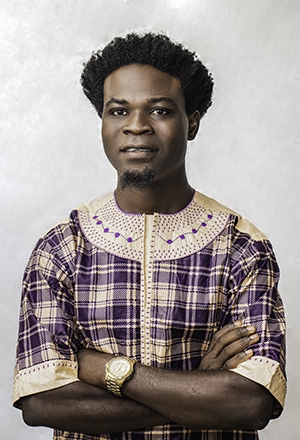Projects for Peace Presents First Alumni Award
Projects for Peace and the Kathryn Wasserman Davis Collaborative in Conflict Transformation at Middlebury have announced the inaugural recipient of the Projects for Peace Alumni Award: human rights and education activist Joseph Kaifala. The newly created award grants up to $50,000 in support of the ongoing peacebuilding efforts of a past Projects for Peace recipient who demonstrates innovation and persistence in working for peace and transforming conflict.

Kaifala was among the first cohort of Projects for Peace grant recipients for his 2007 project titled, “Education as a Project for Peace in Sierra Leone: Constructing a Library in Conakry-Dee.”
A former Davis United World College Scholar, Kaifala earned his bachelor’s degree from Skidmore College, a master’s in international relations from Syracuse University, and his juris doctorate from Vermont Law School. As a Davis United World Colleges Summer Nonproliferation Fellow at the Middlebury Institute’s James Martin Center for Nonproliferation Studies, he researched issues relating to the U.S.-Africa Command, African Nuclear Weapons Free Zone Treaty, Nonproliferation Treaty, and Comprehensive Test Ban Treaty.
“We’ve been inspired by Joseph’s work, from his commitment to Projects for Peace at Skidmore to his work at the Middlebury Institute, and now in his vision for Sierra Leone,” said Middlebury President Laurie Patton. “It’s a powerful testament to the enduring strength of this program that students who launched their careers as peace builders years ago have persisted in this crucial work.”
Summoning Peace from Hardship
A survivor of the 11-year civil war in Sierra Leone, Kaifala has focused his career on peace, human rights, and rebuilding in his home country. In 2009, he launched the Jeneba Project, a nonprofit providing educational opportunities for adolescent girls.
“Children were particularly affected by that conflict, many of them conscripted as combatants,” Kaifala said in his application. “Educational institutions were used as bases and vandalized. This is why my original Project for Peace was directed toward rebuilding educational infrastructure and providing scholarships to marginalized girls.”
After his initial library project, Kaifala remained concerned about marginalized girls who were either out of school or less likely to complete secondary school due to obstacles such as poverty, teenage pregnancy, lack of uniforms and school fees, and period poverty. In 2018, as part of the Jeneba Project, he led the construction of Sengbe Pieh Girls Excellence Academy, a high school for girls in Robis, Sierra Leone.
“We have removed many of the obstacles that force girls to drop out or not enroll,” noted Kaifala.
He is also founder of the Sierra Leone Memory Project, an oral history program dedicated to recording testimonies from survivors of the civil war, including former child soldiers, amputees, and survivors of rape.
A Path to Conflict Transformation
The Projects for Peace Alumni Award was developed in collaboration with the Kathryn Wasserman Davis Collaborative in Conflict Transformation, which asked candidates to envision the role of conflict transformation in their work.
Kaifala plans to use the award to expand opportunities for schoolchildren in Sierra Leone to visit the Civil War Memorial in Freetown. It’s essential, he says, for students to learn about transitional justice mechanisms—the ways in which societies respond to legacies of massive and serious human rights violations—in order to promote a culture of peace and nonviolence. The funds will help ensure his organization reaches students in all parts of the country, helping to fulfill a mandate of Sierra Leone’s Truth and Reconciliation Commission.
According to Kaifala, conflict transformation in the field of transitional justice “serves as an open exploration of the causes of conflict in order to create spaces for forgiveness, reconciliation, and the intentional rebuilding of society embedded with structures and values that prevent similar conflicts in the future.”
Conflict transformation requires deep contextual knowledge, creativity, and partnership in order to move from destructive dynamics to more constructive conflicts, says Sarah Stroup, professor of political science and director of the Conflict Transformation Collaborative. “The Projects for Peace alumni finalists each embodied these commitments, and they offer inspirational examples that peacebuilding is possible.”
About Projects for Peace
Projects for Peace is a global program that encourages young adults to develop innovative, community-centered, and scalable responses to the world’s most pressing issues. Student leaders have increased their knowledge, improved skills, and established identities as peace builders and changemakers.
Each year 100 or more student leaders from participating institutions are awarded a grant in the amount of $10,000 each to implement a Project for Peace anywhere in the world, typically over summer break. Projects for Peace are grassroots activities that address root causes of conflict and promote peace. Visit the Projects for Peace website for more information.

